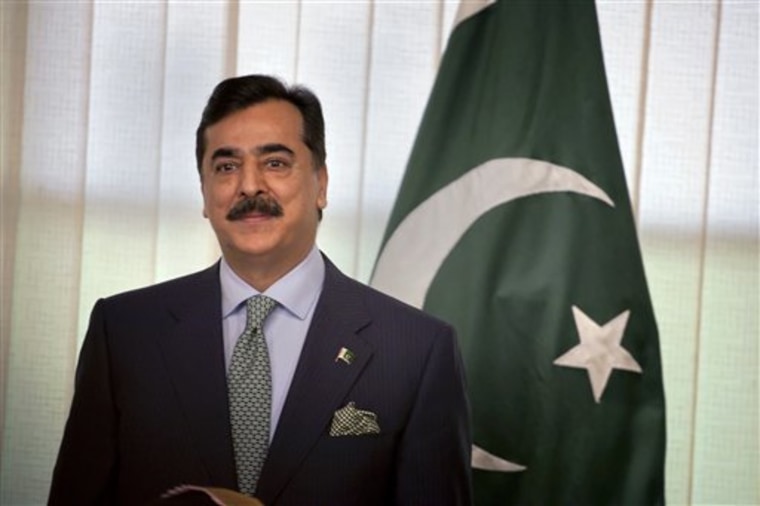Pakistan's Supreme Court charged the prime minister with contempt on Monday for defying its orders to reopen a corruption case against his political ally, President Asif Ali Zardari, sharpening a political crisis that has gripped the country.
Prime Minister Yousuf Raza Gilani has said that if he was convicted he would be forced to step down. He could also face up to six months in jail.
However, the case — which has raised tension between Pakistan's civilian leaders and the Supreme Court — is expected to drag on and paralyze decision-making.
On Monday, Gilani drove to the court himself, accompanied by his lawyer, amid tight security. Helicopters buzzed over a rainy and overcast Islamabad, and hundreds of police blocked roads leading to the court building in the capital.
Gilani said he understood the charges after they were read out and pledged to contest them.
Kickbacks alleged
The move was the formal start to a process that will now take weeks or months to conclude. The next session will be on Feb. 22.
The case against Zardari relates to kickbacks he and his late wife, former Prime Minister Benazir Bhutto, allegedly received from Swiss companies when Bhutto was in power in the 1990s. They were found guilty in absentia in a Swiss court in 2003.
Zardari appealed, but Swiss prosecutors dropped the case after the Pakistani parliament passed an ordinance giving the president and others immunity from old corruption cases that many agreed were politically motivated.
The bill was decried by many in Pakistan, who saw it as an attempt to subvert the law. The Supreme Court ruled it unconstitutional in 2009, and also ordered the government to write a letter to Swiss authorities requesting they reopen the case. The government has refused, saying the president enjoys immunity from prosecution while in office.
Personal vendetta?
Court supporters say the judges are upholding the rule of law. But government loyalists accuse the chief justice of pursuing a personal vendetta against the president, or of acting on behalf of the army to topple the government.
Analysts say Gilani seems willing to sacrifice himself and go to jail for the benefit of his party. But no matter how it ends, the case has distracted the government from dealing with the country's ailing economy and a violent Islamist insurgency.
"The prime minister's actions reek of protecting the president over our system of democracy," the Express Tribune newspaper said in an editorial.
"Even if the president's immunity is upheld, it will no longer be applicable once he is out of office and in that eventuality there may be no legal or constitutional hitch in preventing the Supreme Court from going ahead on this issue."
That is the view held by many other commentators, who hail the Supreme Court's actions as a badly needed advance for the rule of law and accountability in Pakistan, where corruption tops the list of opinion polls as the country's biggest problem.
The political turmoil has been a problem for the United States as well, because it wants Pakistan to focus on repairing troubled relations between the two countries and help negotiate peace with the Taliban in Afghanistan.
"The case has been very destabilizing because it has increased uncertainty, and the government is always worried about its survival," said Pakistani political analyst Hasan-Askari Rizvi. "A government whose performance is poor has become poorer."
Others say the Supreme Court's pursuit of Zardari and his Pakistan People's Party (PPP) is bad for democracy and strengthens the hand of the powerful military, which has staged three coups since 1947 and ruled the country for more than half of its history.
"At one level, this serves the army's purposes," said Najim Sethi, editor of the weekly Friday Times. "They want the politicians to fight amongst themselves and remain discredited."
